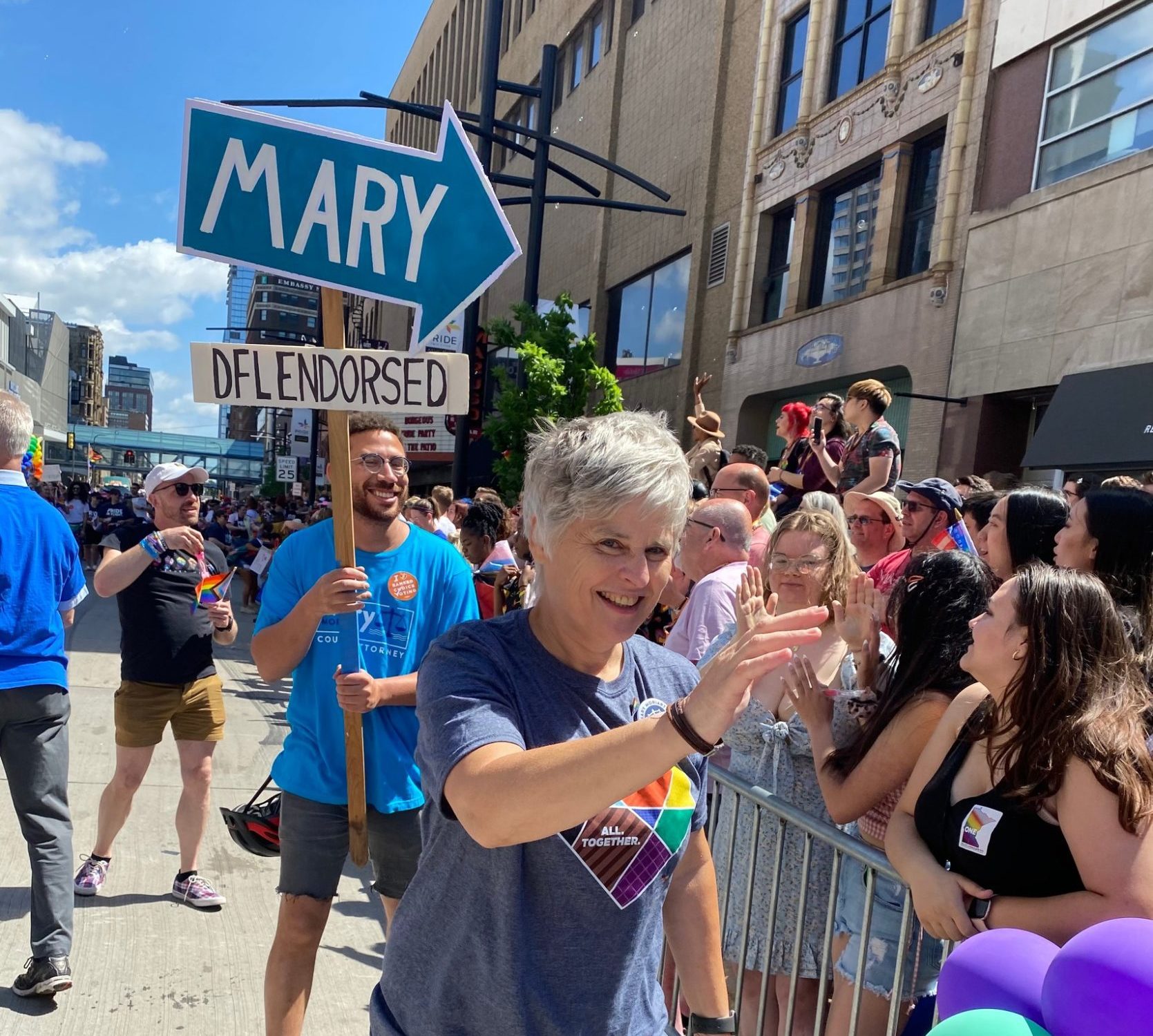Minneapolis Elects a Career Public Defender as Its New Prosecutor
Mary Moriarty easily prevailed in Hennepin County over a former judge who ran on law-and-order. She will be one of several new reform prosecutors.
Camille Squires, Daniel Nichanian | November 9, 2022


In 2019, Mary Moriarty, the chief public defender of Minnesota’s Hennepin County, sounded the alarm. Upon reviewing arrests made by the Minneapolis police over low-level marijuana sales, her office discovered that 98 percent of the people the police arrested over a five-month period had been Black. When the office made this public, the police stopped its sting operations, and County Attorney Mike Freeman announced he would halt marijuana prosecutions.
Still, Moriarty continued to assail the racial disparities in law enforcement, calling herself “angry and disappointed” over the behavior of the MPD and the prosecutor’s office. The following year, months after George Floyd’s murder in Minneapolis unleashed a national reckoning over police violence, Moriarty was ousted from her job in what she called retaliation over her speaking out for racial justice in the county.
Now Moriarty is heading back into a prominent public role, but this time she will take over the prosecutor’s office.
In a major victory for reform prosecutors, Moriarty easily won the race for Hennepin County Attorney on Tuesday, with 58 percent of the vote. She defeated her opponent Martha Holton Dimick, a retired county judge and a former prosecutor in the office. (Freeman announced earlier this year he would not seek re-election.)
Moriarty and Holton Dimick embraced opposing sides in a national debate on criminal justice—a progressive turn versus more of a tough-on-crime approach—that traces back to a long history of conflict in the Minneapolis region, Eamon Whalen reported last month in a joint article for Bolts and Mother Jones.
Moriarty says she was moved to run for county prosecutor after seeing the tide turn on the racial justice reckoning and criminal justice reforms that began to emerge in the wake of the 2020 George Floyd uprisings.
“I did see an opportunity for change slipping away,” she told Bolts and Mother Jones. “And I thought, people who really value public safety, and a fair and just system need to step up during this time of turmoil and really present options that aren’t the same old things we’ve had for decades, which haven’t kept us safer.”
Moriarty promised to ramp up police accountability and to institute a “do-not-call” list that would bar her staff from relying on police officers who have been shown to repeatedly lie on the stand as witnesses in cases. She also said she would seek to expand alternatives to incarceration such as diversion and restorative justice programs.
Her opponent, Holton Dimick, accused progressives of endangering public safety by criticizing police, claiming a “narrative” that police should be defunded was fueling crime. “[Defund] was basically giving the criminal element in our city and across the county, the go-ahead and commit crimes sign,” she told Bolts and Mother Jones. She has also attacked Moriarty over her background as a defense attorney.
Moriarty and Holton Dimick have circled one another throughout their career, as one worked for the public defender’s office and the other was a prosecutor under now-U.S. Senator Amy Klobuchar, the former county attorney. The two once found themselves on opposite sides of a case where the judge dismissed charges against the person Moriarty was defending and admonished the prosecutor, Holton Dimick, for how aggressively she attempted to pursue charges against the man.
Moriarty is one of several reformers who seized new prosecutor offices on Tuesday. Kelly Higgins, a Democratic defense attorney, won the DA race in fast-growing Hays County, Texas, after promising a “sea change” in the county; he told Bolts that he was moved toward more progressive positions by a group of activists that have been organizing in Central Texas.
Kimberly Graham, who represents abused and neglected children in court, won in Polk County, (Des Moines), Iowa’s most populous county. She told Bolts in June that she was inspired to run upon hearing a podcast interview with Rachael Rollins, the former DA of Boston who was one of the flag-bearers for so-called progressive prosecutors.
Reform candidates suffered losses as well as Republican incumbents prevailed in critical races in Plymouth County, Massachusetts, and Douglas County, Nebraska. In Dallas and San Antonio, Democratic DAs beat tough-on-crime challenges. Other major races for prosecutor remained undecided as of publication in Maricopa County (Phoenix), Arizona, Alameda County (Oakland), California, and King County (Seattle), Washington.
In Minneapolis, the prosecutor race acquired special importance given the conflicts over race and policing in the months and years that have followed George Floyd’s murder in May 2020, and it morphed into a test of how Minneapolis voters—especially those living in areas that are seeing higher levels of crime—define public safety.
Last year, progressive activists championed Question 2, a measure that would have dismantled the Minneapolis Police Department, replacing it with a new public agency in charge of safety, but voters rejected it. Holton Dimick publicly opposed the measure at the time, and this year she was backed by local leaders like Minneapolis Mayor Jacob Frey who opposed it as well. Moriarty declined to say how she voted last year, but she had the backing of prominent progressives who supported it such as Attorney General Keith Elison and U.S. Rep. Ilhan Omar.
During her campaign, Holton Dimick invoked that result as showing a desire for more law enforcement, and she stressed that the 2021 measure failed in north Minneapolis, a predominantly Black part of Minneapolis that has faced rising gun violence, as evidence that the communities most affected by crime would prefer her law-and-order message. (Question 2 also failed last year, and by a larger margin, in the wealthier wards of southwest Minneapolis.)
But on Tuesday, as reporter Eamon Whalen tweeted, Moriarty carried nearly all precincts in the wards that make up north Minneapolis.


